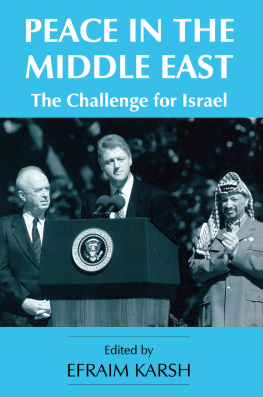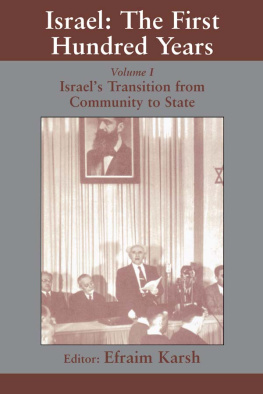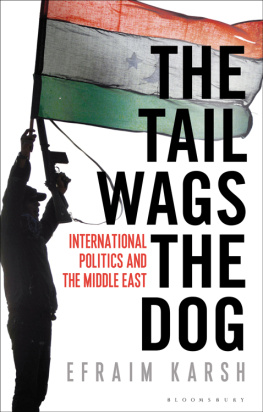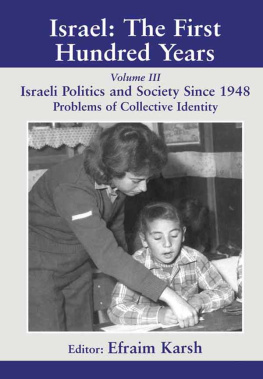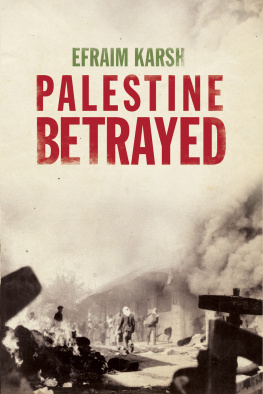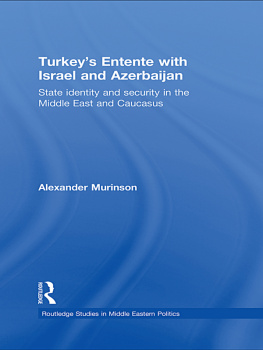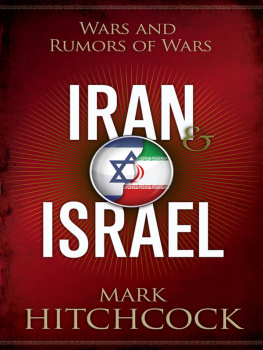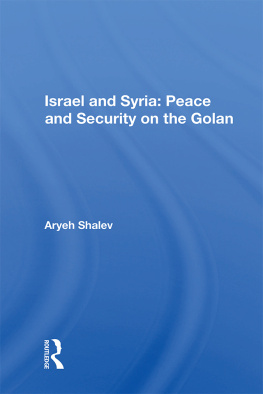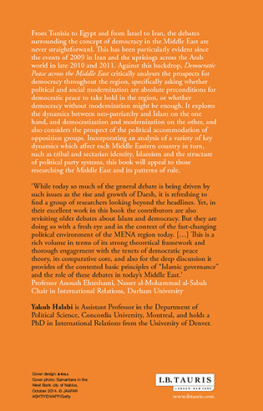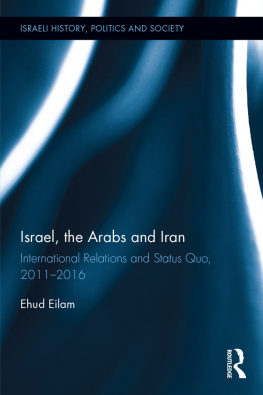Karsh - Peace in the Middle East : the Challenge for Israel
Here you can read online Karsh - Peace in the Middle East : the Challenge for Israel full text of the book (entire story) in english for free. Download pdf and epub, get meaning, cover and reviews about this ebook. City: Hoboken, Israel, Israel, year: 2014, publisher: Routledge;Taylor and Francis, genre: Politics. Description of the work, (preface) as well as reviews are available. Best literature library LitArk.com created for fans of good reading and offers a wide selection of genres:
Romance novel
Science fiction
Adventure
Detective
Science
History
Home and family
Prose
Art
Politics
Computer
Non-fiction
Religion
Business
Children
Humor
Choose a favorite category and find really read worthwhile books. Enjoy immersion in the world of imagination, feel the emotions of the characters or learn something new for yourself, make an fascinating discovery.
Peace in the Middle East : the Challenge for Israel: summary, description and annotation
We offer to read an annotation, description, summary or preface (depends on what the author of the book "Peace in the Middle East : the Challenge for Israel" wrote himself). If you haven't found the necessary information about the book — write in the comments, we will try to find it.
Peace in the Middle East : the Challenge for Israel — read online for free the complete book (whole text) full work
Below is the text of the book, divided by pages. System saving the place of the last page read, allows you to conveniently read the book "Peace in the Middle East : the Challenge for Israel" online for free, without having to search again every time where you left off. Put a bookmark, and you can go to the page where you finished reading at any time.
Font size:
Interval:
Bookmark:

PEACE IN THE MIDDLE EAST: THE CHALLENGE FOR ISRAEL
Peace in the Middle East: The Challenge for Israel
edited by
EFRAIM KARSH

First published 1994 by
FRANK CASS & CO. LTD.
Published 2013 by Routledge
2 Park Square, Milton Park, Abingdon, Oxon OX14 4RN
711 Third Avenue, New York, NY, 10017, USA
Routledge is an imprint of the Taylor & Francis Group, an informa business
Copyright 1994 Frank Cass & Co. Ltd.
British Library Cataloguing in Publication Data
Peace in the Middle East: Challenge for Israel
I. Karsh, Efraim
327.1720956
Library of Congress Cataloging in Publication Data
A catalog record of this book is available from the Library of Congress
ISBN 13: 978-0-714-64614-5 (hbk)
ISBN 13: 978-0-714-64141-6 (pbk)
This group of studies first appeared in a Special Issue on Peace in the Middle East: The Challenge for Israel of Israel Affairs, Vol. 1, No. 1, Autumn 1994, published by Frank Cass & Co. Ltd.
All rights reserved. No part of this publication may be reproduced in any form or by any means, electronic, mechanical, photocopying, recording or otherwise, without the prior permission of the publisher.
Typeset by Vitaset, Paddock Wood, Kent
Contents
Efraim Karsh
P.J. Vatikiotis
Dov S. Zakheim
Max Beloff
Moshe Brawer
Bernard Reich
Ben-Zion Zilberfarb
Aharon Klieman
Rosemary Hollis
Elisha Efrat
Michael Keren
EFRAIM KARSH
A S IT approaches its fiftieth anniversary, the State of Israel seems closer than ever to its professed loftiest ideal: contractual peace with all its Arab neighbours, first and foremost the Palestinians. The Declaration of Principles on Palestinian Interim Self-Government Arrangements, signed on the White House Lawn on 13 September 1993, was a watershed in the one-hundred-year war between Arabs and Jews. After a century of denial and rejection, of blood-letting and bereavement, Arabs and Jews have finally agreed to bury the hatchet and settle for peace, based on mutual recognition and acceptance. Jordan followed the Palestinian example within a day by signing ajoint agenda with Israel on the framework for peace. Even President Hafiz Asad of Syria, the paragon of Arab rejection of the fact of Israel, has been grudgingly reconciling himself to the idea of a fully-fledged peace with the Jewish state.
This is neither to ignore the problems and obstacles that lie ahead, nor to discount the disruptive power of extremists on both sides, as starkly demonstrated by the Hebron, Afula and Hadera massacres. Yet, even the most implacable foes of the IsraeliPalestinian agreement would concede that it has changed the Middle Eastern political landscape beyond recognition. The RabinArafat handshake; the countless working sessions between Israel and the PLO; the bursts of joy in Gaza and Jericho on the arrival of the first Palestinian policemen; visits by Israeli officials to Gulf emirates and their hosts open endorsement for close economic relations with Israel, all these images of the rapidly changing Middle East are unlikely to evaporate into thin air in the face of future setbacks, which are bound to accompany the historic reconciliation between Arabs and Jews.
This volume explores the significance and implications of the nascent peace process for Israel, its security, economic well-being and international standing. In the opening contribution, P.J. Vatikiotis, a longtime observer of Middle Eastern affairs, casts a personal gloss on the ArabIsraeli peace process. He views the IsraeliPalestinian accord as the best news I have had in fifty years of living with this conflict, and believes that the mutual resignation to the notion of peaceful coexistence, embedded in the agreement, can readily culminate in comprehensive peace and regional cooperation. However, were Arabs and Israelis to prove unable to surmount the acrimonious legacy between them and Vatikiotis considers religious-cultural rejectionism as peaces worst enemy then a physical separation between these two communities or nations must be effected, with international forces interposed between them as a buffer.
This cautious optimism is shared by other writers. According to Dov Zakheim, while peace will allow Israel to rationalize its defence expenditures and restructure its armed forces, it will still need to maintain a strong military posture to account not only for threats from states not willing to subscribe to a settlement at all, but those that might renege on it. This, in turn, will demand considerable resources that will probably wipe out any chance of peace dividend, other than that which might be realized through increased military sales abroad. That, however, remains a small price to pay for obtaining what Israel has sought since its birth: a reduced threat of war and therefore, a far less stressful existence for its citizens.
A more sanguine assessment of the economic implications of peace is offered by Ben-Zion Zilberfarb. Although sceptical of peaces direct economic gains, such as a trade boom between Israel and the Palestinian autonomy, or for that matter between Israel and the wider Arab world, he deems the indirect effects of peace to be highly beneficial to the Israeli economy. These include trade relations with countries which hitherto refused to trade with Israel, and a possible increase in foreign direct investments. Above all, he estimates that a gradual reduction in military outlays and its diversion to development investments may increase Israels economic output by $35 billion over a ten-year period, a substantial gain indeed.
Where Israel has already reaped a substantial peace dividend is in the critical realm of Israel among the nations. The special relationship with the United States, which plunged to one of its lowest ebbs during the latter part of the Bush presidency, has made an impressive recovery following Labours ascendency in June 1992 and the resultant reinvigoration of the peace process; so have Israels relations with the European Community. Yet while Bernard Reich expects the USIsraeli relationship to retain its uniqueness for the foreseeable future, if not without occasional frictions and disagreements, Rosemary Hollis is more sceptical on how close Israels relations with the European Union can become. Not only have the West Europeans been more lukewarm than their American counterparts towards Israel over the past decades; not only do the internal politics of the European Union and the fear of economic competition preclude a full Israeli membership, but from the perspective of the EU, Israel is and will remain part of the Middle East.
The peace dividend, argues Aharon Klieman, has not been confined to Israels enhanced standing and active re-engagement with the international community; it has also mitigated the wariness and distrust with which Israelis tend to view the outside world, ushering in a greater spirit of openness and self-assurance. In the words of Prime Minister Yitzhak Rabin: We have got to rescue ourselves from the pervading sense of isolation gripping us for the better part of a half-century. We must join the worldwide movement towards peace, conciliation and cooperation, for otherwise we shall be left behind, standing alone at the station platform. One special relationship that has already been affected by this buoyant mood, and is certain to undergo a fundamental transformation as the peace process unfolds, is that between Israel and the Jewish diaspora. As Max Beloff puts it,
Next pageFont size:
Interval:
Bookmark:
Similar books «Peace in the Middle East : the Challenge for Israel»
Look at similar books to Peace in the Middle East : the Challenge for Israel. We have selected literature similar in name and meaning in the hope of providing readers with more options to find new, interesting, not yet read works.
Discussion, reviews of the book Peace in the Middle East : the Challenge for Israel and just readers' own opinions. Leave your comments, write what you think about the work, its meaning or the main characters. Specify what exactly you liked and what you didn't like, and why you think so.

